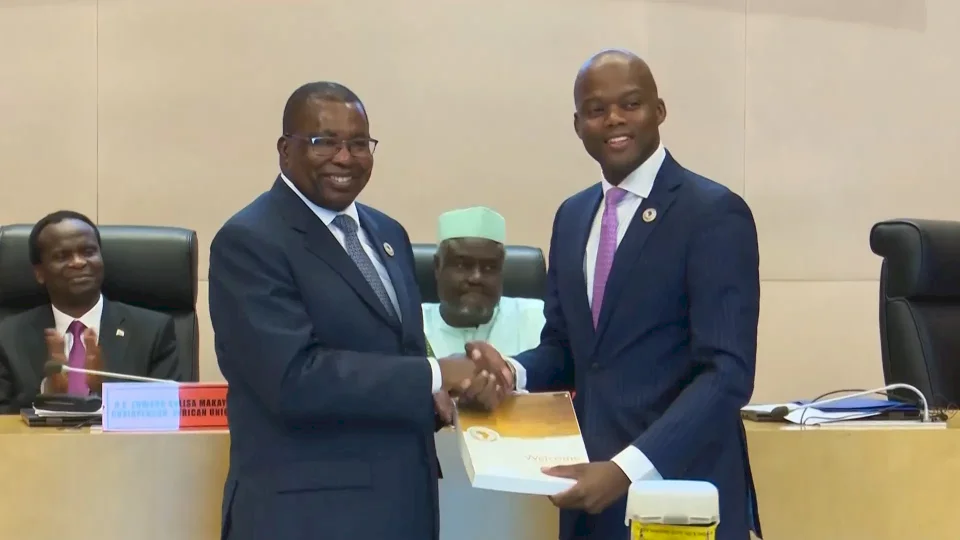
African Free Trade Agreement: A Stumbling Start and Slow Expansion
SadaNews - Although African countries officially began to liberate trade between them since 2012, reaching a formal agreement on this matter was only realized at the beginning of 2019. This was followed by the lengthy process of involving the relevant countries, which has recently been partially completed, as Eritrea has not yet ratified the agreement.
Implementation of the Continental Free Trade Area (CFTA) agreement began in early 2021, following the election of Wamkele Mene as the first Secretary-General of the area on February 20, 2020, and the selection of Accra, Ghana's capital, as the headquarters of the secretariat.
African countries aspire to create a unified market that includes 55 countries, with a population of about 1.3 billion and an estimated GDP of around 3.4 trillion US dollars.
Great ambitions and realistic challenges
In commenting on the agreement, the British newspaper "The Economist" described the project as one of the most prominent initiatives of the African Union, seeing it as a step towards transforming the continent into a global economic power in the coming decades.
However, the newspaper pointed out that the benefits of the agreement will not be equally distributed among countries, as some lack basic transport networks, while others suffer from the impacts of violence and conflicts, requiring wide political cooperation, as change will not happen overnight.
For its part, the World Bank expects that the agreement will help raise the continent's GDP by 7%, amounting to nearly 450 billion dollars by 2035, thanks to reduced tariffs and the removal of non-tariff barriers. It is also likely to help lift about 30 million people out of extreme poverty and 68 million from moderate poverty.
The agreement's provisions include the removal of trade barriers, enhancing intra-African trade, and developing value-added products in service sectors, alongside establishing regional value chains, which allow for greater investment opportunities and job creation.
Delayed Birth: Causes and Implications
After years of organizational and institutional work, the inquiry about the reasons behind the delay in the birth of this project, its level of growth, what has been achieved on the ground, and the means to propel it towards broader horizons has started.
American-Kenyan academic David Munda attributes this delay to the prevailing bureaucracy in many African countries, which is manifested in governments’ reservations towards sensitive political files, especially trade.
He adds in his talk to Al Jazeera Net that some regimes fear losing control over commercial activities, which is seen as a threat to their survival in power.
Additionally, the proliferation of regional blocs within the continent and the traditional division based on dominant languages (English, French, Portuguese...) are all factors that contributed to delaying the agreement's conclusion. This is compounded by differing perceptions between countries, as weaker economies are concerned about unfair competition with countries that have larger economies, slowing their steps toward integration.
Limited Progress Amid Chronic Challenges
Nearly five years after the signing of the agreement, Munda, a political economy professor at New York City University, believes that the desired objectives have not yet been achieved, as African countries still account for less than 3% of global trade, while intra-African trade remains the weakest compared to other international blocs.
He asserts that political crises pose a significant barrier to establishing a free African market, as some countries suffer from weak control over borders, while others face the repercussions of wars, terrorism, and climate change, in addition to the fragility of administrative structures.
Despite this, the 2025 Africa Economic Report indicates "significant progress" in implementing the agreement, represented by launching the Trade Facilitation Initiative in October 2022, which currently includes 30 countries, among them Nigeria and South Africa, exchanging a selected group of products.
Building on this experience, the UN report emphasized the need for clear institutional frameworks and urged governments to establish national structures to support the implementation of the agreement.
The report also noted a confusion among some companies that believed the agreement meant an immediate elimination of tariffs, necessitating increased awareness of trade rules.
Recommendations to Enhance Integration
To achieve the agreement's objectives, the report called for addressing infrastructure challenges, as poor road conditions, unreliable energy supplies, and weak port efficiency are all factors that hinder trade flow.
The Secretary-General of the area, Wamkele Mene, has acknowledged on several occasions that creating a common African market requires a long time, noting that the infrastructure deficit is estimated to be around 100 billion dollars.
The report also recommended addressing regulatory imbalances and trade policies between countries and overcoming the limitations of digital trade, which remain underutilized in inter-trade transactions.
For his part, Munda stressed the importance of enhancing regional economic mechanisms in each geographical area before moving on to major continental plans.
He also called for the political will of leaders, addressing non-tariff barriers, reducing bureaucracy, and increasing diversity and value-added production within the continent, instead of relying excessively on exporting raw materials.
He believes that this diversity would enhance intra-African trade and provide more products that can be traded within the continent, ultimately leading to achieving deeper economic integration.
Source: Al Jazeera

Barclays: Oil Prices Could Reach $80 per Barrel

Bitcoin Falls Near $63,000 Following Attack on Iran

The Trap of High Prices: Debts Haunt Germans and Bankruptcy Knocks at Their Doors

Major Changes in the Saudi Public Investment Fund… What is Happening?

Gold Stabilizes and Heads for its Seventh Consecutive Monthly Gain

The IMF Disburses Approximately $2.3 Billion to Egypt Following Two Reviews of the "Reform...

Oil Rises Amid Expectations for Nuclear Negotiations Between Washington and Tehran
